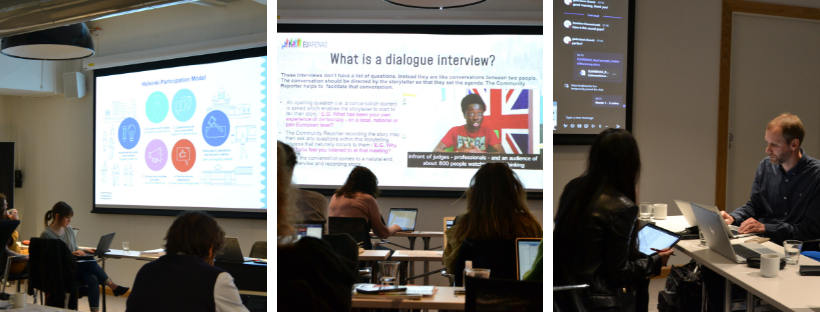EUARENAS – PROJECT MEETING IN HELSINKI

Earlier this month our team finally – after almost a year of working remotely – managed to me the EUARENAS consortium in-person in Helsinki, Finland. Although, the jam-packed meeting schedule meant that we didn’t get to see much of what Helsinki has to offer, we did get to get into discussions about participatory and deliberative democracies. So, here’s a bit of a run down of what we took away from the meeting…
On day one, the City of Helsinki presented a case study of how they’d been engaging with citizens. A big takeaway for us was that the first step in this process was the creation of principles for participation that help guide all future activities. The importance of being clear on what underpins participation was a key point highlighted by the City as this helps you to navigate what follows – sort of like how Responsible Storytelling practices underpins Community Reporting, an acts as a guide on storytelling practice.
When discussing how the case study research into existing deliberative and participatory practices would be conducted, partners exchanged thoughts on how Community Reporting and focus interviews could be used to gather different perspectives on each case study. Questions over how authentic people would be with their accounts if it was not anonymous and how we could enable political leaders and other decision-makers to speak honestly given that what they say may cause issues in their careers were raised. The takeaway from this discussion for us was how fundamental relationships of trust are to this type of work, and the importance of creating spaces in which people can share their experiences openly. Hopefully, the project’s forthcoming guidelines on how to work with different actors in the research processes will help in this respect.
On day two, we started to create a common project language – or glossary of terms – that we would use with consistency across the different research activities in the project. What was interesting during this activity was the different perspectives that people from academic, policy and civil society brought to the discussion. Some opted for more pragmatic and to-the-point definitions of key terms, whereas others went for more nuanced and intricate definitions. For us, it seemed that people’s sector played a bigger role in how they approached the definitions than cultural differences.
This day was also our time to shine and provide the partners with some training in Community Reporting. We played a clip from a story from the EuroCohort project and it was great to see how people reacted to it. When the clip was playing our ‘agenda less’ and ‘peer-to-peer’ approach made sense to our partners and they quickly got to grips with some of our techniques and dialogue interviewed each other about their own experiences of democracy. We also showcased an initial set of guidelines that we’ve been working on that combines lived experience storytelling and future-thinking. Partners will be testing out these guidelines over the coming months and by Summer 2022, we’ll have a public set to release – so please do, watch this space!
On the final day, LUISS delivered an interactive workshop on impact. As part of the workshop we worked in groups to start to determine the impact indicators of the pilots in the project. A key point in the subsequent discussion was how do we develop indicators for less tangible impacts (i.e. better quality relationships). This is something that purely quantitative evidence could not demonstrate and is a core thing the project will be grappling with.
And finally, we wanted to give a bit of a shout out to a new tool we were introduced to LUISS – Aha slides: https://ahaslides.com/v2/ This online tool helps with live quizzing and word cloud generation via a presentation format, and seemed to work really well from a range of devices. Definitely one we will be trying out in the future!